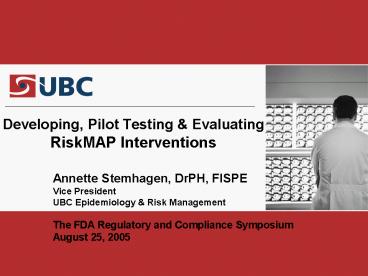Developing, Pilot Testing - PowerPoint PPT Presentation
Title:
Developing, Pilot Testing
Description:
Target key groups most likely to be able to minimize risk ... Market research data. Competitive products. Physician prescribing behavior ... – PowerPoint PPT presentation
Number of Views:460
Avg rating:3.0/5.0
Title: Developing, Pilot Testing
1
Developing, Pilot Testing Evaluating RiskMAP
Interventions
- Annette Stemhagen, DrPH, FISPE
- Vice President
- UBC Epidemiology Risk Management
- The FDA Regulatory and Compliance Symposium
- August 25, 2005
2
Risk Minimization (RiskMAP) Guidance
- Goal minimize a products risks while
preserving its benefits. - For the majority of products, routine risk
minimization measures are sufficient - RiskMAP -- strategic safety program minimizing
known risks of a product while preserving its
benefits. - A RiskMAP uses tools to achieve goals.
- Development and Use of Risk Minimization Action
Plans (RiskMAPs)http//www.fda.gov/cder/guidance/
6358fnl.htm
2
3
How to Design a Risk Minimization Program
- Complete risk and benefit assessment
- Define goals and objectives for risk minimization
intervention - Identify appropriate tools
- Conduct feasibility
3
4
Risk and Benefit Assessment
- Quantify risks, if possible
- High risk populations?
- Specific doses?
- Inappropriate use?
- Off-label use?
- Misuse or abuse?
- Evaluate risk in context of benefit
4
5
Goals and Objectives for Risk Minimization
- Ideal Goals
- No deaths
- No abuse
- No pregnancies
- No patients taking drug X also take Drug Y
- Specify objectives
- Inform all health care professionals
- Inform all patients
- Increase knowledge of appropriate use
- Require pregnancy test before each prescription
fill
5
6
RiskMAP Tool Selection
- Maintain widest accessibility with least burden
to health care system - Target key groups most likely to be able to
minimize risk - Determine the feasibility of proposed approach
6
7
Categories of RiskMAP Tools
- Targeted Education and Outreach
- Increase appropriate knowledge and behaviors of
stakeholders who have the capacity to prevent or
mitigate risks - Reminder Systems
- Systems that prompt, remind or guide in
prescribing, dispensing, or using a product to
minimize risk - Performance-Linked Access Systems
- Link product access to laboratory testing or
other documentation.
7
8
RiskMAP Tools
- Targeted education and outreach
- Health care provider letters
- Training programs
- Continuing education
- Patient package inserts
- Medication Guides
- Promotional techniques
8
9
RiskMAP Tools
- Reminder systems, processes or forms
- Patient agreement or acknowledgement forms
- Health care practitioner certification or
attestation programs - Limited Rx amount or refills
- Specialized packaging to enhance safety
- Prescription stickers
- Special prescription pads
9
10
RiskMAP Tools
- Performance-linked access systems that guide
prescribing, dispensing and use - Compulsory reminder systems
- Certification of prescribers/dispensers
- Documentation of safe-use conditions
- blood tests for agranulocytosis
- pregnancy tests
10
11
How Can You Determine if Your Approach Will
Succeed?
- Feasibility assessments prior to designing
intervention - Pilot testing prior to full implementation, if
feasible - Ongoing evaluation over the life of the program
11
12
Initial Feasibility Assessments
- Determine likelihood of success with
- Stakeholders
- Physicians
- Pharmacists
- Patients and caregivers
- Wholesalers/distributors
- Others
- Program Design
- Fit busy practice routine?
- Represent actual clinical practice?
- Need no extraordinary testing?
- Requires minimal training?
12
13
Assessing Feasibility Using Existing Data
- Medical chart review
- Natural history of disease
- Cross sectional surveys, e.g., NCHS
- Registries
- Large automated databases
- Market research data
- Competitive products
- Physician prescribing behavior
- ISS and ISE (particularly placebo groups)
- Literature
- Past experience
13
14
Ad Hoc Data Collection for Assessing Feasibility
- Panel of experts
- Focus groups
- Stakeholder surveys
- Health Care Providers
- Patients
- General population sample
- Time and Motion studies
14
15
Ongoing Feasibility Throughout the Program
- Conduct Failure Mode and Effects Analysis (FMEA)
- Test your assumptions
- How good were the data?
- How good were the assumptions?
- Projected vs. actual
- Implement mid-course corrections
15
16
Pilot Test Tools
- Qualitative and quantitative testing of
educational materials - Health literacy
- Comprehension
- Randomized trial of educational programs
- User acceptance testing of systems
- Phased roll out of program to small group of
physicians prior to widespread implementation - Registry
- Large streamlined study
16
17
RiskMAP Evaluation
- Continually assess modify
- Use evidence based performance measures
- At least two different approaches
- Quantitative, representative, minimally biased
- Measure health outcome goal
- Surrogates
- Process measures
- KAB
17
18
Evaluation Strategies
- Root Cause Analysis
- Spontaneous AE report monitoring (Medication
errors) - Record review
- Stakeholder surveys
- Knowledge, Attitude and Behavior
- Program audits
- System audit trail
18
19
Evaluation Strategies
- Large automated database study
- National surveys databases, e.g., DAWN, TESS
- Market research data, e.g., IMS-Health
- Registries
- Product exposure registry
- Pregnancy registry
- Large streamlined study
19
20
What Works in Risk Minimization?
- Really dont have enough history to know
- Involves changing behaviors and/or
systemseducation? marketing? - Limited/controlled distribution works
- No blood, no drug
- Attestation, testing, limiting access in other
ways - Lotronex
20
21
What Doesnt Work in Risk Minimization?
- Severe restriction of use via complex program
- Dofetilide
- Plenaxis
- Unintended consequences
- Unrealistic study size or expectations
21































